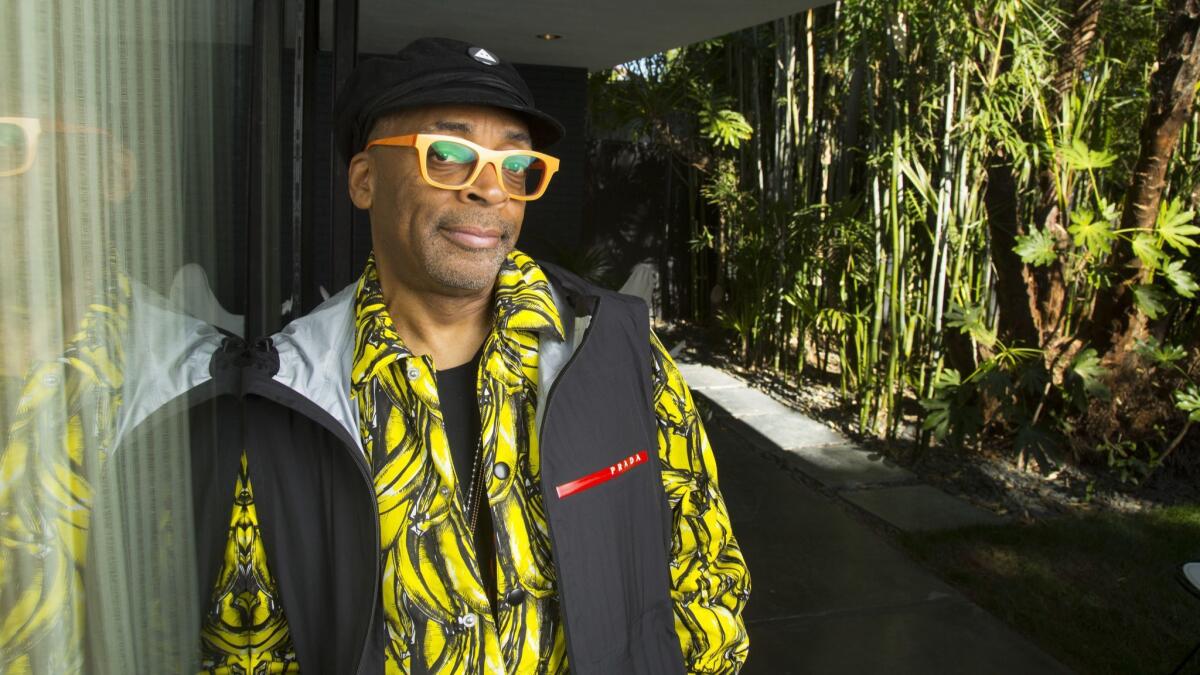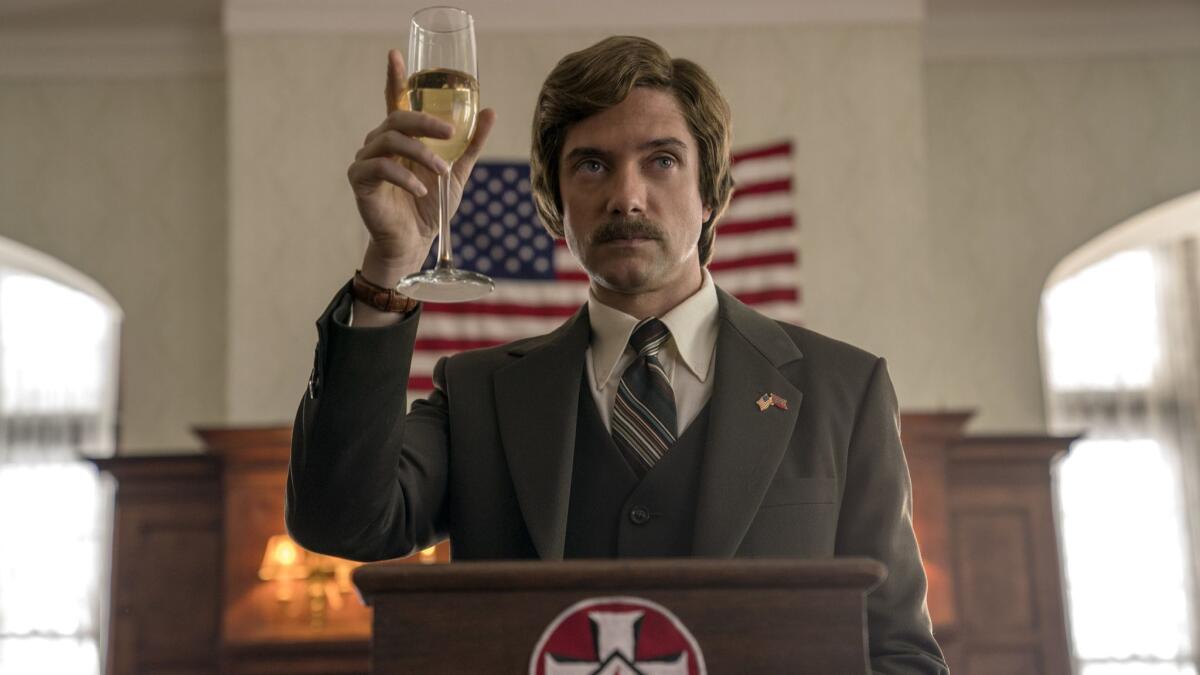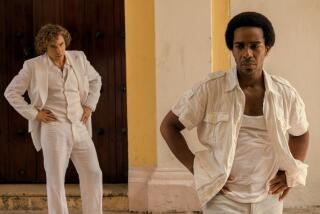‘BlacKkKlansman’: Spike Lee’s urgent message about terrorism, truth and Donald Trump

- Share via
“I was shook.”
It happened nearly 30 years ago, but for Spike Lee the memory of seeing D.W. Griffith’s “The Birth of a Nation” during his first year at NYU’s Tisch School of the Arts remains vivid. Lee had seen clips from the 1915 landmark silent film, known equally for its blatant racism and cinematic innovation. But he had never watched the entire movie until his first year in film school.
The classroom discussion afterward focused solely on Griffith’s filmmaking techniques. Lee listened and stewed, waiting for some mention of the fact that the movie not only glorified the Ku Klux Klan but also revitalized the then-dormant group, an awakening that led to lynchings and terrorist acts.
That acknowledgment never came that day. But Lee has made a point of emphasizing it himself throughout his career, starting with “The Answer,” a 20-minute student film he made at NYU about a black filmmaker being given $50 million to remake “The Birth of a Nation,” and continuing through the sharp satire of 2000’s “Bamboozled” and now with his most recent effort, “BlacKkKlansman,” where we see Klan members watch and celebrate racist images in Griffith’s movie during a secret initiation.
What the star of ‘BlacKkKlansman’ learned from the real black cop who infiltrated the KKK »
“The only thing I added to that ‘BlacKkKlansman’ scene was the popcorn,” Lee said on a recent October morning, sitting on a bungalow patio at the Chateau Marmont, appreciating the early autumn sunshine and palm trees so much that when the conversation turned animated — as it always does with the candid Lee — he offered an apology to the surrounding flora. (“I don’t want my profanity to blemish these beautiful palm trees here in the hills of L.A.,” he said, laughing.)
The aforementioned profanity is mostly directed toward Donald Trump (“Agent Orange,” as Lee calls him), whose presence is felt and, on one occasion, seen in “BlacKkKlansman,” Lee’s hit movie about the real-life Ron Stallworth (John David Washington), a black detective who infiltrated a Colorado chapter of the Ku Klux Klan in the early 1970s with the help of a white colleague.
Ask Lee how he became involved in the project (a pitch from Jordan Peele), why he wanted to do it (to show that bigotry and fear of the other has been a constant throughout American history) and what he wanted moviegoers to feel while watching it (urgency), the conversation will always — often immediately — circle back to Trump.
Not to say there aren’t some occasional, unexpected diversions. I’m not sure if Lee has ever engaged a film journalist at length without mentioning the fact that “Driving Miss Daisy” won the Oscar for best picture in 1989, the year “Do the Right Thing,” his masterful look at race relations in America, was released. “And not nominated,” Lee said, preemptively issuing another apology to the palm trees before adding: “Not to be disrespectful or anything, but ‘Driving Miss Daisy’ does not … hold up.”
Warming to the subject of what does — and does not — enter the canon of film and music, Lee offered: “I was doing some research of the greatest albums of all time. And I was looking for where Prince is, Michael Jackson, James Brown. According to Rolling Stone, ‘Thriller’ is No. 20. I have love for everybody … well, not everybody … but the Beach Boys are No. 2. What’s that album? ‘Pet Shop?’ [It’s “Pet Sounds.”] Brian Wilson is a bad mother…, but how is that ahead of ‘Thriller’ and ‘Purple Rain’?”
“I’m going to be honest,” he said, answering his own question. “You have to ask: ‘Who’s voting?’ The outcome depends on that. ‘Moonlight’ winning best picture and all this other stuff, that’s not possible if that woman who was president of the academy [Cheryl Boone Isaacs] doesn’t take the initiative and change the makeup of the membership.”
“But a lot of people don’t like change and diversity,” Lee continued, broadening the conversation. “The United States Census Bureau — not me — has said that as early as 2035, white Americans will be a minority. And a lot of what’s happening today, especially with Agent Orange, is a reaction to what the census bureau stated.”
With “BlacKkKlansman,” Lee examines that reaction, bluntly showing that the racism held by Klan members Stallworth encountered nearly a half-century ago lives in America today, sometimes blatant, often couched in code words. When it’s mentioned in the movie that Klan leader David Duke (played by Topher Grace) is developing a mainstream political strategy that could be supported by “everyday Americans,” Stallworth objects.

“America would never elect somebody like David Duke president,” he says. Stallworth’s sergeant tells him he should know better.
“What [co-screenwriter] Kevin [Willmott] and I wanted to do is make a hip period piece that is about today,” Lee said. “And it wasn’t that hard to do. So much of this hate stuff is recycled. Agent Orange did not come up with the slogan ‘Make America Great Again.’ Or ‘America First.’ That was used by the Klan in the 1920s.”
Trump and the real Duke are seen at the end of the movie when Lee cuts to video footage from the 2017 white nationalist rally in Charlottesville, Va., including images of activist Heather Heyer’s death. (Lee dedicated the movie to Heyer.) Trump’s response to the events (“very fine people on both sides”) and Duke’s tacit endorsement of Trump are also shown.
“That was like an emotional haymaker from Mike Tyson,” lead actor Washington said of the ending in a phone interview. “It wasn’t some sort of take or perspective from the lens of Spike Lee. This is actually America.”
Calling from New York a couple of weeks after our initial conversation, Lee recalled some critical comments about the choice to end “BlacKkKlansman” with the raw, unflinching video footage. He hasn’t for a moment second-guessed that decision, a call he made after asking Heyer’s mother, Susan Bro, for permission.
“Since we last talked, another homegrown act of American terrorism, the shooting at the Pittsburgh synagogue, happened,” Lee said. “For people who don’t think the coda of ‘BlacKkKlansman’ should be Charlottesville, look at what happened after Charlottesville. You could make the argument that when the president refused to repudiate evil, he gave it a green light. People see Heather Heyer murdered in Charlottesville and the president did not condemn it. That’s the green light.”
“I don’t care what nobody says,” Lee continued, “this film will be on the right side of history, the same way ‘Do the Right Thing’ was in 1989. Truth does not get old.”
Twitter: @glennwhipp
More to Read
From the Oscars to the Emmys.
Get the Envelope newsletter for exclusive awards season coverage, behind-the-scenes stories from the Envelope podcast and columnist Glenn Whipp’s must-read analysis.
You may occasionally receive promotional content from the Los Angeles Times.











